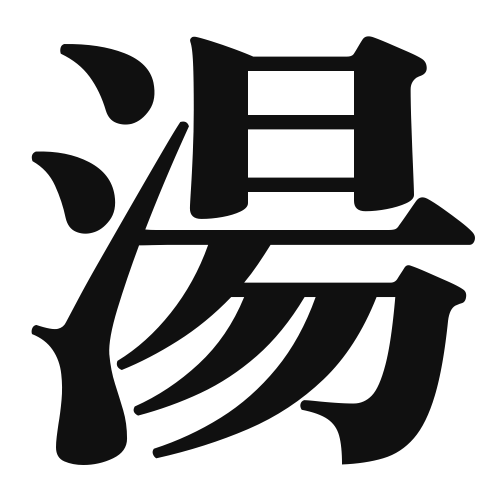1. Overview of Meaning
The kanji “湯” (yuu) means “hot water” or “soup.” It is commonly associated with bathing, cooking, and various culinary contexts in Japanese culture.
2. Formation and Radical
Formation of the Kanji: The kanji “湯” is a phonetic-ideographic character (形声文字). It combines the water radical (氵) on the left, indicating its relation to water, and the character “羊” (sheep) on the right, which contributes to its pronunciation.
Radical: The radical of “湯” is 氵, which is the water radical, commonly found in kanji related to water or liquid.
3. Examples of Usage
Common Words and Phrases:
- お湯 (oyu) – hot water
- 湯船 (yubune) – bathtub
- 湯気 (yuge) – steam
Example Sentences in Daily Conversation:
- お湯を沸かしてください。 (Oyu o wakashite kudasai.) – Please boil the water.
- 湯船に入るのが好きです。 (Yubune ni hairu no ga suki desu.) – I like to take a bath in the bathtub.
4. Synonyms and Antonyms
Similar Kanji:
- 水 (mizu) – water: Refers to water in general, while “湯” specifically refers to hot water.
- スープ (suupu) – soup: A liquid dish, often made with hot water, but “湯” emphasizes the hot water aspect.
Antonyms:
- 冷水 (reisui) – cold water: Refers to water that is not heated, contrasting with “湯.”
5. Cultural and Historical Background
Relation to Japanese Culture: “湯” is significant in Japanese culture, especially in the context of onsen (hot springs) and traditional bathing practices. It symbolizes relaxation and health.
Proverbs and Idioms:
- 湯を沸かす (yu o wakasu) – to boil water: Often used metaphorically to mean preparing for something.
- 湯気が立つ (yuge ga tatsu) – steam rises: Used to describe something that is fresh or new.
